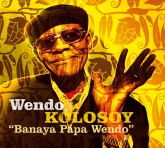Congolese music is one of the most influential music of the African continent since the 1930s. Congolese musicians had a huge impact on the African musical scene and outside. Many contemporary genres of music were created or heavily influenced by Congolese music. As the genre of music in Kenya Benga or in Colombia Champeta. Democratic republic of Congo and are contemporary hub music in Africa since the 1930s /50s. Congolese rumba joined in 2021, other living traditions such as Jamaican reggae music and Cuban rumba on Unesco's "intangible cultural heritage of humanity" list. Music of the Democratic Republic of the Congo varies in its different forms. Outside Africa, most music from the Democratic Republic of Congo is called Soukous, which most accurately refers instead to a dance popular in the late 1960s. The term rumba or rock-rumba is also used generically to refer to Congolese music, though neither is precise nor accurately descriptive.

Moïse Kapenda Tshombe was a Congolese businessman and politician. He served as the president of the secessionist State of Katanga from 1960 to 1963 and as prime minister of the Democratic Republic of the Congo from 1964 to 1965.

Jules Shungu Wembadio Pene Kikumba, known professionally as Papa Wemba, was a Congolese singer and musician who played Congolese rumba, soukous, and ndombolo. Dubbed the "King of Rumba Rock", he was one of the most popular musicians of his time in Africa and played an important role in world music. He was also a fashion icon who popularized the Sape look and style through his musical group Viva la Musica, with whom he performed on stages throughout the world.

Antoine Christophe Agbepa Mumba, known professionally as Koffi Olomidé, is a Congolese Soukus singer, dancer, producer, and composer. He has had several gold records in his career. He is the founder of the Quartier Latin International orchestra with many notable artists, including Fally Ipupa and Ferré Gola.
M'bilia Bel is a rumba and world music singer from the Democratic Republic of the Congo. She is known as the "Queen of Congolese and African Rumba". She rose to fame after first being discovered by Sam Manguana and later by Tabu Ley Rochereau who helped her gain confidence, master her powerful soprano voice, and achieve acclaim as one of the best Congolese female singers.
Nyboma Mwan'dido, often simply Nyboma, a prominent Congolese soukous tenor vocalist, has been over a fifty-year span a leading member of several outstanding bands, including Orchestre Lipua Lipua, Orchestre Kamale, Les Quatre Étoiles, and Kékélé, in addition to performing and recording as a solo artist. He is widely recognized as one of the best singers in Congolese music.
Bisso Na Bisso is a music collective of rappers and singers with origins from Congo Brazzaville formed in 1999. The group consisting of Ben-J, Lino and Calbo, Doc and G Kill, Mystik and the only female M'Passi was put together by French rapper Passi.

Antoine Wendo Kolosoy, known as Papa Wendo, was a Congolese musician. He is considered the "Father" of Congolese rumba, also known as soukous, a musical style blending son cubano, beguine, waltz, tango and cha-cha.
Mbenzu Ngamboni Bokili, better known as Bozi Boziana, is a Congolese singer, songwriter and bandleader. He has been in several major soukous bands, including Orchestre Bamboula, Minzoto Sangela, Zaiko Langa Langa, Isifi Lokole, Yoka Lokole, Langa Langa Stars and Choc Stars, and founded his own band, Orchestre Anti-Choc, which is considered among the most influential of the genre and also notable for introducing up to three female vocalists at any one time into this band all of whom became celebrities in their own right, a tradition which continues up to today.
Michel Boyibanda is a soukous recording artist, composer, and vocalist in the Republic of the Congo. He was once a member of the Congolese Rumba band TPOK Jazz, led by François Luambo Makiadi, which dominated the Congolese music scene from the 1950s through the 1980s.

"Ndoki" is a song recorded by Congolese singer Fally Ipupa, from his third studio album Power "Kosa Leka" (2013). Ipupa released the single on YouTube, on April 4, 2013. It is the second single by Fally Ipupa to be remixed by rapper Bigg masta G.
Kekele was a band formed in 2000, composed of leading veteran African musicians, mostly from the Democratic Republic of the Congo. They played Congolese rumba in a revival style harkening back to the 1950s, 60s, and 70s, using acoustic guitars. Kekele seems to be dormant or defunct, having not released a recording since 2006 nor performed since (apparently) 2010.
Marie Misamu, whose real name is Marie Misamu Ngolo, was a cantor, Congolese composer born November 16, 1974 in Kinshasa and died January 16, 2016 still in the same place.
Moise Mbiye is a Congolese gospel singer-songwriter and pastor in Kinshasa, Democratic Republic of the Congo.

L'Or Lemba-Mbongo is a Congolese singer–songwriter and cantor living in Kinshasa. She had made 7 albums during the course from 2003 to 2019.

Frédéric Vandewalle was a Belgian colonel and diplomat in the Belgian Congo and independent Congo. He was an influential figure right before and after Congo's independence from Belgium. He was one of the organisers of the Katangese secession and led Operation Ommegang against the Simba rebellion during the Congo Crisis. His precise role in the assassination of Patrice Lumumba is the subject of debate among historians.
Tshanda Sangwa is a Swiss-Congolese actor and musician.
Mike Kalambay is a Congolese gospel singer-songwriter whose origin is from Kinshasa, Democratic Republic of the Congo. Mike Kalambay also founded Mike Kalambay & Shekina Music.
Defao was a Congolese singer-songwriter. He was formerly a member of the prominent soukous groups Grand Zaiko Wawa and Choc Stars.






